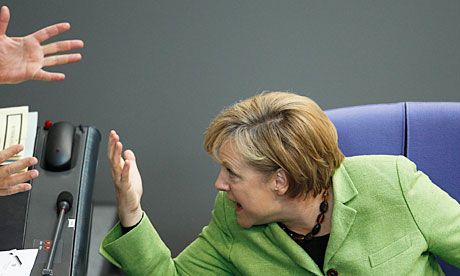THE GUARDIAN: Germany is increasingly resentful of being seen as the cashpoint for its cash-strapped southern neighbours

At a recent summit of European leaders in Brussels, Angela Merkel was feeling tetchy.
As the 27 government chiefs wrestled with compulsory jobs targets for the decade ahead, the German chancellor balked when asked to stick to the same employment rate as everyone else.
"Not all the member states will reach that target," she answered, according to a note of the summit made available to the Guardian. "If some don't go so far, does this mean Germany has to [go further]?" No one asked Berlin to do more than its partners. But Merkel suspected otherwise. The discussion turned to climate change targets. Again Merkel complained. Germany, she signalled, was getting a raw deal in Europe, a sentiment reinforced by senior people in her entourage such as Uwe Corsepius, her influential European adviser.
The prickliness is symptomatic of the change in how Berlin sees the EU. For 50 years, Europe has been Germany's passport to peace, prosperity and power. When Germany pursued its national interests, it did so effectively, benignly and called it "Europa". Those days are over. The German elite feels maligned and misunderstood. In public, and much more frankly in private, senior figures talk of robustly asserting the German national interest.
"It may be new for Europe that Germany is representing its interests with new vigour," said Thomas de Maizière, the interior minister and a Merkel confidant. "But for Britain, France or Italy, this was always a matter of course."
"The mood among the Germans is quite defensive. They feel people are ganging up on them," said an EU ambassador.
A senior official in Brussels who deals regularly with Merkel added: "The love affair [with Europe] is over. When I meet German journalists, they ask 'what is the added value of Europe for Germany'."
The change – from pushing Europe forward to balking at the sacrifices Germany has to make – is a tectonic shift in the EU.
Nowhere has the new approach been more striking than in the euro crisis, where Merkel's mixture of hectoring and hesitation has shocked fellow EU leaders and generated mutual recrimination. The financial crisis exposed fundamental differences in outlook between northern and southern Europe, and conflicts of national interest between Germany and France. Egged on by both the tabloids and quality newspapers engaging in an orgy of Greece-bashing and injured outrage verging on self-pity, Berlin is slumped in surly resentment at being seen as the cashpoint for cash-strapped southern Europeans. >>> Ian Traynor in Brussels | Wednesday, June 02, 2010